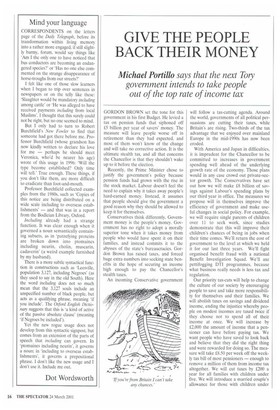Mind your language
CORRESPONDENTS on the letters page of the Daily Telegraph, before its transformation within living memory into a rather more engaged, if still slightly barmy, forum, would say things like 'Am I the only one to have noticed that bus conductors are becoming an endangered species?' or 'Has no one else commented on the strange disappearance of horse-troughs from our streets?'
I felt like one of those slow learners when I began to trip over sentences in newspapers or on the telly like these: 'Slaughter would be mandatory including among cattle' or 'He was alleged to have received payments including from local Muslims'. I thought that this surely could not be right, but no one seemed to mind.
But I only had to turn to Robert Burchfield's New Fowler to find that someone had got there before me. Professor Burchfield (whose grandson has now kindly written to declare his love for me — perhaps he should meet Veronica, who'd be nearer his age) wrote of this usage in 1996: 'Will the type become established? Only time will tell.' True enough. These things, if you don't like them, are more difficult to eradicate than foot-and-mouth.
Professor Burchfield collected examples from the 1980s, such as 'Copies of this notice are being distributed on a wide scale including to overseas establishments' — and that was in a report from the Bodleian Library, Oxford.
Including already had a strange function. It was clear enough when it governed a noun semantically containing subsets, as in 'putrefying proteins are broken down into ptomaines including neurin, cholin, muscarin, cadaverin' (a weird example furnished by my husband).
There is a more subtle syntactical function in constructions such as 'Leesville, population 3,127, including Negroes' (as they used to say in the old South). Here the word including does not so much mean that the 3,127 souls include an unspecified number of black people, but acts as a qualifying phrase, meaning 'if you include'. The Oxford English Dictionary suggests that this is 'a kind of active of the passive absolute clause' (meaning 'if Negroes be included').
Yet the new rogue usage does not develop from this syntactic signpost, but comes from an extension of the parts of speech that including can govern. In 'ptomaines including neurin', it governs a noun: in 'including to overseas establishments', it governs a prepositional phrase. I don't like the new usage and I don't use it. Include me out.














































































 Previous page
Previous page